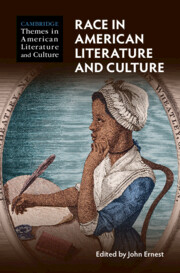Book contents
- Race in American Literature and Culture
- Cambridge Themes in American Literature and Culture
- Race in American Literature and Culture
- Copyright page
- Contents
- Contributors
- Acknowledgments
- Introduction
- Part I Fractured Foundations
- Part II Racial Citizenship
- Part III Contending Forces
- Part IV Reconfigurations
- Part V Envisioning Race
- Part VI Case Studies
- Chapter 19 Collective Biographies and African American History
- Chapter 20 Aztlan for the Middle Class
- Chapter 21 The Racial Underground
- Chapter 22 Literature in Hawaiian Pidgin and the Critique of Asian Settler Colonialism
- Chapter 23 Celeste Ng’s Little Fires Everywhere and the Burning House of American Literature
- Part VII Reflections and Prospects
- Index
Chapter 22 - Literature in Hawaiian Pidgin and the Critique of Asian Settler Colonialism
from Part VI - Case Studies
Published online by Cambridge University Press: 26 May 2022
- Race in American Literature and Culture
- Cambridge Themes in American Literature and Culture
- Race in American Literature and Culture
- Copyright page
- Contents
- Contributors
- Acknowledgments
- Introduction
- Part I Fractured Foundations
- Part II Racial Citizenship
- Part III Contending Forces
- Part IV Reconfigurations
- Part V Envisioning Race
- Part VI Case Studies
- Chapter 19 Collective Biographies and African American History
- Chapter 20 Aztlan for the Middle Class
- Chapter 21 The Racial Underground
- Chapter 22 Literature in Hawaiian Pidgin and the Critique of Asian Settler Colonialism
- Chapter 23 Celeste Ng’s Little Fires Everywhere and the Burning House of American Literature
- Part VII Reflections and Prospects
- Index
Summary
In this essay, I draw on scholarship in sociolinguistics and liberal political theory on language diversity and linguistic justice to examine whether literature in Hawaiian Pidgin can still have a countercultural force given the criticism of Asian settler colonialism. Literary criticism on literature in Pidgin has focused on demonstrating the capacity of the much-stigmatized language to represent the rich and varied culture of its speakers. In this process, literature in Pidgin has come to be associated with a countercultural position that illuminates the dynamics of social domination. Here, I turn to the controversy surrounding Bamboo Ridge, an independent publishing house and journal established by Eric Chock and Darrell H. Y. Lum in 1978, and the writings of Lee A. Tonouchi and Lisa Linn Kanae to explore the significance of literature in Pidgin in relation to new political and cultural consciousness of the enduring and wide-ranging repercussions of settler colonialism. I locate in Pidgin’s guerilla philosophy an idea of linguistic justice that approaches the concept from experiences of linguistic domination rather than from liberal ideas of justice and suggest that literature in Pidgin can be an ally to indigenous rights and claims based on its philosophy of critiquing cultural hegemony.
Keywords
- Type
- Chapter
- Information
- Race in American Literature and Culture , pp. 362 - 378Publisher: Cambridge University PressPrint publication year: 2022



